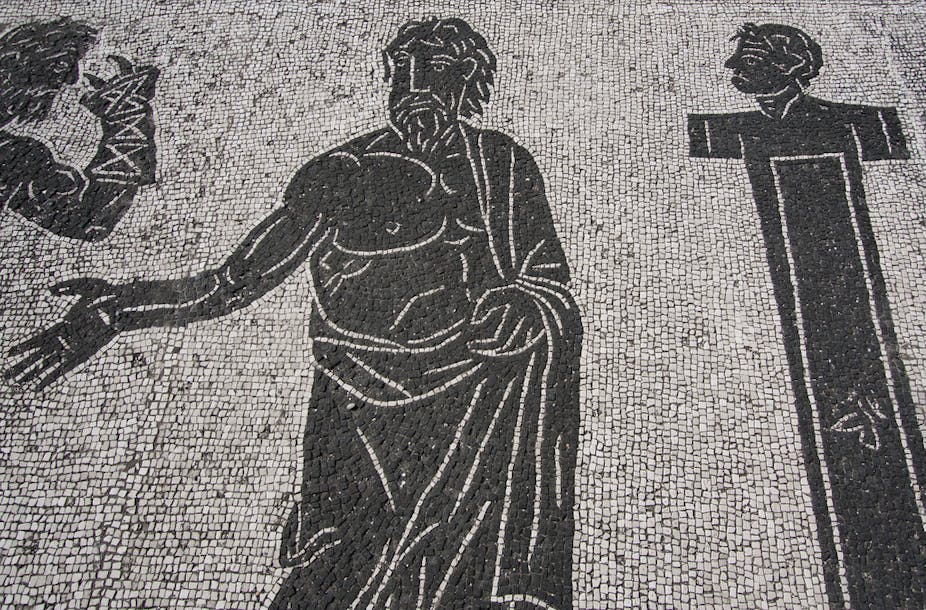While just under half of all philosophy undergraduates in the UK are women, women account for less than a third of PhD completions and less than a quarter of permanent academic staff. So where did all the women go, and – more importantly – why?
That’s a hard question to answer without some serious research – which we don’t yet have, because until very recently the marked absence of women philosophers wasn’t even a topic of casual discussion amongst philosophers, let alone one deemed worthy of further investigation. But here’s my hypothesis: gender stereotypes are a major contributor.
A couple of years ago, I ran an unscientific psychology test on my first-year logic class. I asked them to picture the “ideal” logic student, and then – having pictured them in some detail – to assign them a name. More than 90% of the class assigned a male name. The students had been at university less than a week, hadn’t even started studying logic yet, and were in a logic class where, visibly, roughly half the students were female.
And then what happens as students go through their three years of undergraduate study? Most – probably all – of the historical figures they study will be men (Plato, Aristotle, Descartes, Hume, Kant), and most of the contemporary texts they read will be by men.
Now add a somewhat combative approach to philosophical discussion – not something undergraduates are especially exposed to, perhaps, but postgraduates are likely to be. We’re not, fortunately, talking Westminster levels of macho posturing here; nobody, in my experience, has actually jeered at someone while they’re talking in a philosophy seminar, or audibly muttered “stupid woman”, as William Hague recently did.
But let’s not pretend that the average Q&A in a philosophy seminar is merely an earnest and dispassionate attempt to uncover the truth. You can tell someone that you disagree with them, or ask them how they might defend their view against a particular criticism, without telling them they’ve made an obvious mistake, in a tone of voice that suggests that they’re being dumb.
All of this adds up, I believe, to a stereotypical association of philosophy with maleness. And once we have a gender stereotype on the table, we enter the territory of some well-confirmed psychological phenomena: unconscious bias (women have to achieve more in order to attain the same level of perceived achievement as men) and stereotype threat: trigger a negative stereotype and your performance suffers. In one study, seven-year-old girls who had just drawn a picture of a doll performed worse on a maths test than ones who had just drawn a picture of a landscape.
More generally, it adds up to an environment where women may well fail to feel at home: the kind of place they’re not supposed to be. A while back you could walk into the wrong bar in a pub – the one where all the locals drink – and everyone would turn around and stare at you in a way that was perhaps not hostile, but certainly indicated that you didn’t belong. In that situation, you could tough it out, or you could turn around and head for the saloon bar. Heading for the saloon bar was certainly a lot easier and generally resulted in a more pleasant drinking experience. That, I suggest, is what women are doing in philosophy: heading for the saloon bar.
Why does this matter? My own view is that gender stereotypes generally are pernicious, whether they favour men or women. But another reason why it matters is that there are a lot of potentially excellent philosophy teachers and researchers who aren’t getting to realise that potential. That’s bad for them, and it’s bad for the profession.
Fortunately, things are changing for the better. The dearth of women in philosophy is now not only the topic of frequent casual conversations; it’s gaining popular media attention. National organisations are taking action: the British Philosophical Association and the Society for Women in Philosophy (UK) now have a joint committee, which I co-chair, for women in philosophy. There are international campaigns, such as the Gendered Conference Campaign. And departments, learned societies, journal editors and individual academics are thinking about what they can do to improve the representation of women. The future for women in philosophy looks a lot brighter than the past.

